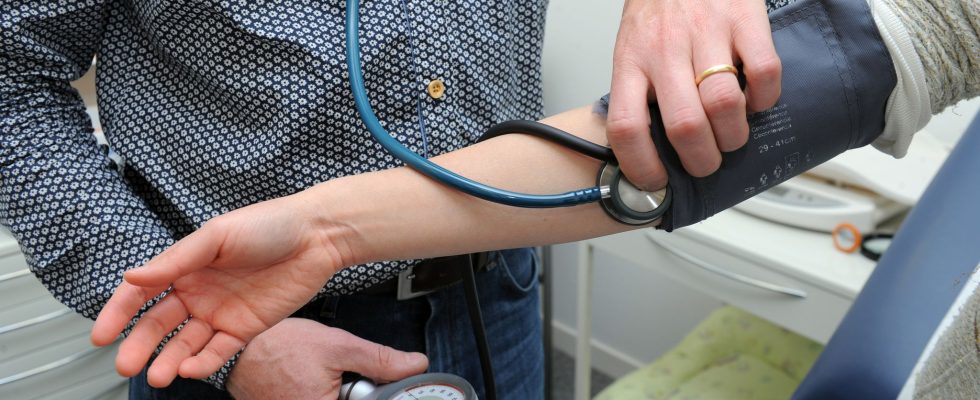“It was too much aggression!” After sixteen years of practice in the same office, in the XVIᵉ arrondissement of Marseille, Dr. Saïd Ouichou ended up going out of business. In September 2022, while he is in consultation, the doctor must stop to calm a patient who has burst into his waiting room. “The man demanded to be taken care of immediately, he was screaming as he knocked on the door of my office, says, still shocked, the Marseille practitioner. I asked him to wait, but he wanted to hit me. Fortunately , the other patients intervened.” For Dr. Ouichou, this aggression, far from being the first, is one too many.
Until he returned his premises, he had chosen not to have the bottom of his front door repaired, cracked by the kick of a patient exasperated at having been taken care of fifteen minutes after his hour. of appointment. “I had left it as a symbol, to remind people of what their actions can lead to,” he confided to L’Express. Just like his pair of glasses broken by a patient unhappy to have to wait her turn. “I had always promised myself to leave the day when I no longer felt safe, and that day has come,” he adds.
23% more attacks in one year
Among doctors and nursing staff, the case of Saïd Ouichou is far from being an exception. According to one study published Tuesday, May 23 by the National Council of the Order of Physicians, the observatory for the safety of doctors notes an increase in declared attacks in 2022. In the space of one year, between 2021 and 2022, violence against physicians increased by 23%. This report is also the sad echo of current events. On the night of Monday to Tuesday, a nurse died after a knife attack at her workplace, within the Reims University Hospital, by a man suffering from psychiatric disorders.
“The aggression of a carer is unspeakable, inadmissible”, declared the Minister of Health, François Braun, during the annual Salon of the Hospital Federation of France (FHF), where a minute of silence was observed. “The time is now for meditation.” The minister, who went to the Reims hospital on Monday evening, assured that a meeting would be organized during the week with professionals in the sector, in order to implement “all the useful measures to preserve safety. and preserve the lives of our caregivers”. François Braun also asked for a minute of silence to be held in all hospitals on Wednesday.
A record of violence since the creation of the security observatory in 2003
In 2021, 1,009 declarations of acts of violence had been made to the observatory for the safety of doctors. In 2022, the organization has 1,244. A record since its creation twenty years ago. In 2003, for the first year of analysis, there were 638 declarations. In the opinion of Dr. Saïd Ouichou, however spectacular these figures are, the trend is “largely underestimated”, because not all doctors declare the violence they suffer.
Faced with these attacks, GPs are on the front line. In the report, they represent 71% of declarations, compared to 60% in 2021. According to the observatory for the safety of doctors, it is also practitioners in city centers who are the most affected by this violence. 56% of incidents are recorded there, compared to 21% in rural areas and 19% in suburbs. Female GPs (representing 56% of victims) are more affected than men (44%). In addition, medical specialists are not spared, first and foremost psychiatrists, cardiologists and obstetrician-gynecologists.
The health system in question?
Attending physician of nearly 2,000 patients in Marseille, Dr Ouichou has not abandoned city medicine. If he closed his practice, where he practiced alone, he moved 3 kilometers further in a room he shares with other practitioners. A pledge of security. According to him, the dissatisfaction and violence of the patients stem from a health system out of breath. “I do not condone violence, but sometimes when we refuse a person who has just been rejected three times before, it creates a certain frustration, an irritation, of which we are the receptacle.”
73% of declaring physicians testify to verbal attacks and threats. “Verbal aggression is every other day,” regrets Dr. Saïd Ouichou. In addition, 10% said they had been victims of theft or attempted theft, while 7% reported a physical assault. In 6% of the cases reported to the observatory, the incident also resulted in the victim being totally incapacitated for work (ITT) for at least three days. Regarding the reasons for this violence, 33% are linked to a reproach relating to care, while 20% are linked to a refusal to prescribe a particular drug or sick leave. 10% to a waiting time deemed too long.
Faced with so much violence, few doctors take legal action on their aggression. Only 30% of the declarants of the survey of the observatory of the safety of doctors filed a complaint and 6% filed a handrail. In question, according to Dr. Ouichou: “Long processes that do not succeed or little.” He filed a complaint no less than four times, including one for death threats and another for physical assault. “All have been closed without further action,” he laments. And to conclude: “Insulting or attacking a doctor must be taken more seriously by the police and the justice system, and this also involves a political posture.”
